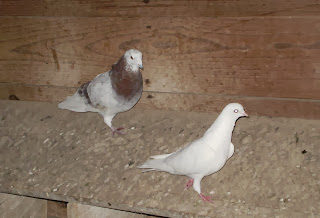One week when I was little, we
ran out of food. My mom was a single mom working two to three jobs, and she was
broke. We went to church and she prayed for a miracle so we could eat for the
week.
When we got home, there were
grocery sacks full of food on our front porch. This re-affirmed her faith in
God for years to come, and she still talks about that miracle to this day.
My mom reads like a book when
she’s upset, the problem was likely obvious to our friends at church and they
helped us out with no expectations of return, or even a note on the bag to
claim credit. This event re-affirmed my faith in humanity and taught me what it
is like to be the recipient of someone’s empathy.
Empathy is the ability to
understand the feelings of someone else. It’s stepping away from me, myself,
and I for a moment to try and connect with someone else.
Compassion and Empathy are two
emotions often looked at as weaknesses, but in fact they are most likely the
emotions our society evolved on. Empathy is a necessity in a social
environment. Big brains burn up big calories, and we are fairly poor physical
specimens for hunting. Getting into groups to take down prey required a
community effort, and without the ability to empathize with your neighbor, a
community founders.
Compassionate hunters took their food home to
share, providing their families and friends with food rather than eating it all
themselves. Compassion passed on more genes then greed, and group effort
hunting allowed us to develop and feed these big energy sucking brains that
have turned our society into what it is today.
If we had been dog-eat-dog from
the beginning, unwilling to hunt in group or co-operate with others, society
never would have started, and we’d of forever remained small-brained cave
monkeys. The empathy to share with our neighbors was a big deal and founded our
modern society and mental development.
But empathy is just as
important to society today as it was then. Being a good leader is all about empathizing
with your co-workers. Everybody has had the horrible boss who just doesn’t get
it, and if you’re lucky you’ve had one of the really great bosses who is there
for you every step of the way. It’s been shown people would rather work at a
harder, more time intensive job with a boss who listens and cares, then at a
cake walk job with an uncaring boss.
You can also improve your boss’s attitude by
being empathetic, discussing things they care about, remembering things that
are important to them. It’s hard to yell at the cheery employee who always asks
about your kid’s grades, or your dog’s illness. The one who meets problems with
a smile, the one you can count on to get things done. You get what you give in
social relationships.
Empathy helps me daily in my
job, and has built my business. Empathy with animals is almost a taboo in the
horse world; and I get told how crazy I am on a regular basis. But I also get
amazing results that people can’t believe. It’s not magic, nor psychic powers.
I ask their horse questions and I listen when he answers. Sometimes, empathy is
as simple as that.
I work on horses of all shapes, sizes, and
personalities. I can’t count how many times someone has told me how much they appreciate
the way I don’t beat their horse. Most farriers hate working on old horses. The
one who is creaky with arthritis, who can’t stand well; the one who threatens
to fall over on you, who leans, who pulls away. No smack with a rasp will
straighten them out; it’s the degrading of old joints and weak muscles that
can’t be helped. It’s common to hear horrible things done to these guys,
because they are bad to work on. Beating, twitching, tying legs up, or laying
the horse down because he’s gotten too sore to stand well.
But you are talking about the horse
that carried someone through every park in Indiana, the one with shelves of ribbons
from shows, who taught their kids to ride, then their grandkids. The one who
has been with them through divorce and death, who has listened to a lifetime of
their problems, fears, and frustrations. The one who has stood politely to have
his feet done for 20 plus years. But today he’s bad and we are justified to
smack and kick him for his bad hips.
I believe it’s an absolutely
disgusting practice. It breaks my heart; to be cruel to some sweet old soul in
pain, simply because he is in pain, is beyond my understanding.
So I massage hips, I contort
myself into pretzel shapes; I give a bucket of grain to keep them occupied. I
spend maybe an extra 10 minutes working on old guys, so they are comfortable
and happy about it. I enjoy their company, and try to make it so they enjoy
mine. And my clients love me for it. I get more referrals, more satisfied
clients, more praise and more tips because of this practice than any other. I
have built my business on compassion for old and lame horses.
You will never convince me that
empathy is anything other than a logical strength. It’s like a muscle, the more
you work it the better it gets. It’s also teaching people how you want to be
treated, when you are compassionate and empathetic, that is what you will get
back. You just can’t yell at someone who is calm, kind, and brought you your
favorite donut.
It’s been scientifically
studied and proven that people who intentionally focus on the positive things
in their lives are happier. Happiness is relative, and usually how happy
someone is at any given moment is dictated by their neighbors, co-workers and
friends. The best way to take control of your own happiness is to look for
positive things in your life. Bad things and experiences are remembered more
strongly than the good things, because of the way our brains process and store
information. So 10 good things may happen to you today without affecting you;
while 1 bad thing will ruin your mood because your brain automatically assigns
it more importance and brings it to notice. Your whole week can be poisoned
with this one bad thing, while you watch hundreds of good things go by
unannounced.
Training your brain to notice the good things
takes conscious effort; you need to run your brain rather than letting it run
you. But in the end you will be measurably happier, and will affect happiness
into the lives of those around you. You are the neighbor, the co-worker and the
friend of someone else; you are affecting their happiness constantly.
Everyone is outfitted with
these amazing intricate minds that they can learn to control and program. Every
obstacle in your life, every difficult person you meet, every car that breaks
down, every pipe that bursts, is either an opportunity to learn and train your
mind in a real world setting, or it is a problem. You are the one who chooses
which it is.
Try to think of someone you
don’t like, or struggle to get along with. Try to think of why they do what
they do, what might have led them to be the way they are. “Because they’re a
stupid butthead” doesn’t count. That’s never the right answer. Play a game,
dust off the brain, and actually think about it. Think about where they are in
life, come up with some valid reasons they may do what they do, and think about
your behavior in their eyes. Think how you can modify your approach, change
your own behavior, and attempt to accept and appreciate who they are as who
they need to be. You can’t change people, you can only change your mind set
about them. You can always find something to appreciate about someone, even if
it is their evil genius or their heroic mental ability to tie their own shoes
in the morning.
Follow it up by doing
something nice for someone. Look for someone who is doing something good, and
appreciate it. Seek it out in your co-workers and families, and especially in
people you struggle with. If absolutely nothing else it will build you up as a
better, happier person and you will know you did your part in making the world
a more enjoyable place by using intellectual empathy.




































